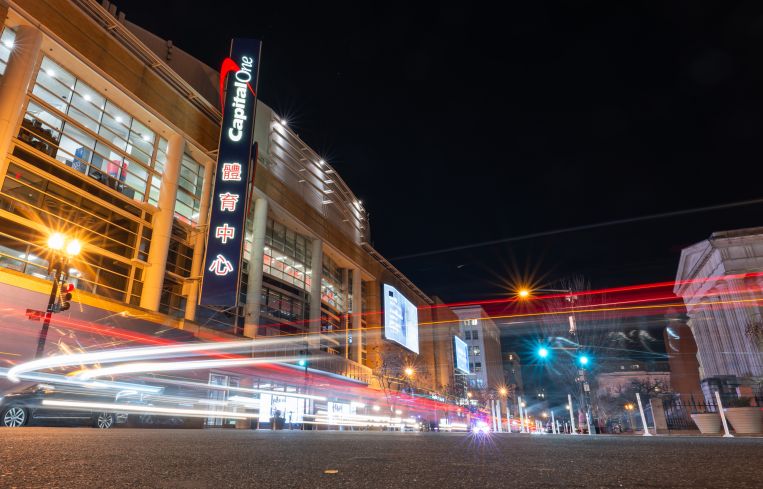Bowser Finalizes Deal to Keep Capitals and Wizards in DC Until 2050
Terms include $515M for arena upgrades, pending D.C. Council approval
By Nick Trombola March 28, 2024 3:41 pm
reprints
Mayor Muriel Bowser has scored a buzzer-beater win for Washington, D.C.
In a stunning reversal, Monumental Sports & Entertainment owner Ted Leonsis has opted to keep the Washington Capitals and Washington Wizards at the Capital One Arena in Washington, D.C., after all, the company and the mayor confirmed Wednesday.
The move, or lack thereof, nixes a plan to relocate the NHL and NBA franchises to a $2 billion mega-development in Alexandria, Va. that would have included a new arena, a practice facility and a headquarters for Monumental Sports.
The deal will keep the two franchise teams in D.C. through 2050, pending approval by the D.C. Council, which appears to be on board.
D.C. has committed to the $500 million in financing it previously offered Monumental to renovate Capital One Arena, which will remain the two teams’ home through 2050. It will also provide $15 million for improvements to an alley connecting the arena to the rest of the Gallery Place neighborhood.
Other terms of the deal are extensive. The deal includes an agreement for an additional 200,000 square feet of “newly programmed space” at the arena and at the mixed-use Gallery Place building next door; a new Wizards practice facility; safety improvements, including 17 dedicated officers on game days; improved logistics around the arena, such as dedicated truck parking for events and dedicated ride-share zones; expedited permitting for further renovations; and the removal of vending, loitering and noise restrictions by creating an “entertainment district” in the surrounding area.
“We are going to have a state-of-the-art urban arena in Downtown D.C. and that’s a great deal for D.C., for the teams, and for the fans,” Bowser said in a statement. “We made a great offer — and kept that offer on the table — because [we] have known all along that this is a win-win for our city and the teams. This is a catalytic investment in Downtown D.C.”
The victory was hard fought for Bowser and her team. Aside from the financial offer, the mayor earlier this year announced the Gallery Place/Chinatown Task Force, with the aim of creating an investment action plan for the future of the neighborhoods, as well as the similarly focused Downtown Action Plan with local business improvement districts (BIDs) to help revitalize a downtown struggling with high office vacancy and low foot traffic in the wake of the COVID-19 pandemic. In late February, the Bowser also opened the District’s first “Safe Commercial Corridor Hub” in Chinatown to manage local public safety and human services challenges.
In December, when Monumental announced the deal to relocate the pro sports teams to Virginia, it was a blow to the District, which was already struggling with plunging office values, an absent office workforce, and other post-pandemic troubles.
“It was a tough pill to swallow back in December, but we knew it was never quite a done deal,” DowntownDC BID President and CEO Gerren Price told the Commercial Observer. “It’s no secret that D.C. has been struggling to gain its footing back since the pandemic, and when Monumental announced they might leave it exacerbated feelings of uncertainty of people here, almost feelings of despair in some ways. But the city still galvanized really quickly, and as the Virginia deal began to fall apart I think Monumental and Ted Leonsis saw those commitments we were making for the future of downtown as more and more attractive.”
Virginia Gov. Glenn Youngkin and Leonsis, founder and chairman of Monumental, announced their intention to move the teams to Alexandria’s Potomac Yard neighborhood back in mid-December. By early March, developer JBG Smith was in the midst of planning a sprawling, 9 million-square-foot entertainment district to support the teams’ new home, provided it won approval from the Virginia General Assembly. Just earlier this week, the company promised to preserve more affordable housing near the development site if the project proceeded.
Yet that approval never came. Facing resistance from some Democrats, the Assembly passed a budget earlier this month that did not include the $1.5 billion in taxpayer funds needed for the project to advance, with few options for Youngkin to renegotiate. By Wednesday, the deal was officially dead.
“While we had made great strides in advancing the project’s transportation plan, overall design and financing structure, the opportunity was derailed largely due to partisan politics and, most troubling, the influence of special interests and potential pay-to-play influences within the Virginia legislature,” JBG Smith CEO Matt Kelly said in a statement to shareholders on Tuesday. “To say we are disappointed is an understatement; we are disgusted with the backroom dealing and opaque scheming that took place as this played out.”
Still, Youngkin and JBG Smith’s loss is D.C.’s gain. Price said that just a few weeks ago, local business owners were telling him they would likely be forced to shut their doors if the teams left. But now, with a dedicated anchor in the community until at least 2050, he said he expects a buzz of interest in the area from new business owners.
“It’s the dawn of a new day for Downtown D.C.,” Price said. “The energy and excitement among people here is palpable — I rode on the Metro yesterday and it’s all anyone was talking about. Personally, I feel like today is the best day I’ve had in a long time.”
Nick Trombola can be reached at NTrombola@commercialobserver.com.



